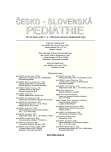Prophylaxis of Early-onset Streptococcal Sepsis in Newborn Infants
Authors:
L. Štillová 1; K. Maťašová 1; J. Štilla 2; M. Zibolen 1
Authors‘ workplace:
Neonatologická klinika JLF UK a UNM, Martin
prednosta prof. MUDr. M. Zibolen, CSc.
1; Klinika stomatológie a maxilofaciálnej chirurgie JLF UK a UNM, Martin
prednostka doc. MUDr. D. Statelová, PhD.
2
Published in:
Čes-slov Pediat 2010; 65 (10): 565-570.
Category:
Original Papers
Overview
Objective:
To determine whether administration of penicillin at birth to a strictly defined group of term newborns is an effective and safe method to prevent early-onset group B streptococcal disease.
Methods:
A protocol for management of asymptomatic full-term infants born to GBS (Group B Streptococcus) colonized mothers was created. Either an abnormality of blood count or presence of more than one obstetric risk factor was chosen as the indication criteria for administering postnatal antibiotic prophylaxis (PAP).
Results:
The study sample consists of 669 newborns (12.9% of all term infants). PAP was administered in 126 cases. Indication criteria included leucocytosis in 116 cases, leucopenia in 4 case and obstetric risk factors in 6 cases. There were 2 cases of clinically manifest infection, but no case of sepsis was proven.
Conclusion:
Early-onset group B Streptococcus disease is a serious but preventable neonatal infection. Maternal intrapartum antibiotic prophylaxis does not prevent all cases of the disease. Management of asymptomatic neonates of GBS colonized mothers is problematic. The authors suggest that the strategy of selective PAP using penicillin may be an effective and safe method in order to reduce morbidity and mortality from streptococcal infections. Postnatal prophylaxis in a strictly defined group of newborn infants at risk for early-onset sepsis, may be effectively combined with intrapartum chemoprophylaxis.
Key words:
neonatal sepsis, early-onset infection, Streptococcus agalactiae, Group B Streptococcus (GBS), penicillin prophylaxis
Sources
1. Lachenauer CS, Wessels MR. Group B Streptococcus. In Kliegman RM, Behrman RE, Jenson HB, Stanton BF. Nelson Textbook of Pediatrics. Philadelphia: Saunders Elsevier, 2007 : 1145–1150.
2. Puopolo KM. Epidemiology of neonatal early-onset sepsis. NeoReviews 2008; 9(12): e571–e579.
3. Stoll BJ. Infections of the neonatal infant. In Kliegman RM, Behrman RE, Jenson HB, Stanton BF. Nelson Textbook of Pediatrics. Philadelphia: Saunders Elsevier, 2007 : 794–811.
4. Schrag S, Gorwitz R, Fultz-Butts K, Schuchat A. Prevention of perinatal group B streptococcal disease. Revised guidelines from Centers for Disease Control and Prevention. MMWR Recomm. Rep. 2002; 51(RR-11): 1–22.
5. Žigo I, Biringer K, Biringerová Z, Biskupská K, Maskálová E. Manažment pacientok s cisárskym rezom. Gynekológia pre Prax 2009; 7(3): 121–124.
6. American Academy of Pediatrics. Revised guidelines for prevention of early onset group B streptococcal infection. Pediatrics 1997; 99 : 489–496.
7. Siegel JD, McCracken GH Jr. Single-dose penicillin prophylaxis of neonatal group-B streptococcal disease: conclusion of a 41 month controlled trial. Lancet 1982; 1 : 1426–1430.
8. Patel DM, Rhodes PG, LeBlanc MH, Graves GR, Glick C, Morrison J. Role of postnatal penicillin prophylaxis in prevention of neonatal group B streptococcus infection. Acta Paediatrica 1999; 88 : 874–879.
9. Pyati SP, Pildes RS, Jacobs NM. Penicillin in infants weighing two kilograms or less with early onset group B streptococcal disease. N. Engl. J. Med. 1983; 308 : 1383–1389.
10. Woodgate P, Flenady V, Steer P. Intramuscular penicillin for the prevention of early onset group B streptococcal infection in newborn infants. Cochrane Database of Systematic Reviews 2004; 2, Art. No.: CD003667. DOI: 10.1002/14651858.CD003667. pub2.
11. Kind C. Betreuung der Neugeborenen von Muttern, die mit Streptokokken der Gruppe B kolonisiert sind. Guidelines. Swiss Society of Neonatology. 2002. URL: http://www.neonet.ch.
12. Štillová L, Strechová Z, Maťašová K, Kolarovszká H, Boďová K, Štilla J, Zibolen M. Postnatal penicillin prophylaxis of early-onset group B Streptococcal infection in term newborns: a preliminary study. Biomedical Papers 2007; 151(1): 79–83.
13. Johri AK, Paoletti LC, Glaser P, Dua M, Sharma PK, Grandi G, Rappuoli R. Group B Streptococcus: global incidence and vaccine development. Nature Rev. Microbiology 2006; 4 : 932–942.
14. Patten S, Vollman AR, Manning SD, Mucenski M, Vidakovich J, Davies HD. Vaccination for Group B Streptococcus during pregnancy: attitudes and concerns of women and health care providers. Soc. Sci. Med. 2006; 63(2): 347–358.
15. Gibbs RS, Schrag S, Schuchat A. Perinatal infection due to group B streptococci. Obstet. Gynecol. 2004; 104 : 1062–1076.
16. Prevention of perinatal group B streptococcal infections. Guidelines from the Belgian Health Council 2003 (SHC.7721). URL: http://www.health.fgov.be/ CSH_HGR/English/Brochures/GBS_EN2003.pdf.
17. Scott K. Guidelines direct treatment choices for group B streptococcus. Pediatric Ann. 2003; 32(9): 632–636.
Labels
Neonatology Paediatrics General practitioner for children and adolescentsArticle was published in
Czech-Slovak Pediatrics

2010 Issue 10
- What Effect Can Be Expected from Limosilactobacillus reuteri in Mucositis and Peri-Implantitis?
- The Importance of Limosilactobacillus reuteri in Administration to Diabetics with Gingivitis
-
All articles in this issue
- Specific Aspects of Selected Sleep Disorders in Childhood
- Prenatal Effects of Alcohol
- Treatament of Tobacco Dependence – New, Important and Difficult Medical Topic
- Prophylaxis of Early-onset Streptococcal Sepsis in Newborn Infants
- Hospitalization of Children for Bronchiolitis in Slovakia in 1996–2006
- Importance of Molecular Genetic Analysis for Diagnosis and Genetic Counseling in Families with Hyperammonemia and Ornithine carbamoyltransferase Deficiency
- Fetomaternal Haemorrhage as a Cause of Severe Neonatal Anaemia
- Procedural Pain in the Newborn: Possible Prevention and Mitigation
- The Problems of Short Frenulum
- Czech-Slovak Pediatrics
- Journal archive
- Current issue
- About the journal
Most read in this issue
- The Problems of Short Frenulum
- Prenatal Effects of Alcohol
- Prophylaxis of Early-onset Streptococcal Sepsis in Newborn Infants
- Fetomaternal Haemorrhage as a Cause of Severe Neonatal Anaemia
